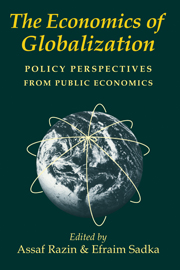Book contents
- Frontmatter
- Contents
- Preface
- List of Contributors
- Introduction
- I International Mobility of Technology
- II Capital Flows and Exchange-Rate Misalignment
- III Tax Incentives and Patterns of Capital Flows
- IV Limits to Income Redistribution in Federal Systems
- V Tax Harmonization, Tax Coordination, and the “Disappearing Taxpayer”
- VI Political-Economy Aspects of International Tax Competition
- VII Migration of Skilled and Unskilled Labor
- 14 Economic Integration, Factor Mobility, and Wage Convergence
- 15 Human-Capital Formation, Asymmetric Information, and the Dynamics of International Migration
- VIII Fiscal Aspects of Monetary Unification
- Index
15 - Human-Capital Formation, Asymmetric Information, and the Dynamics of International Migration
Published online by Cambridge University Press: 28 January 2010
- Frontmatter
- Contents
- Preface
- List of Contributors
- Introduction
- I International Mobility of Technology
- II Capital Flows and Exchange-Rate Misalignment
- III Tax Incentives and Patterns of Capital Flows
- IV Limits to Income Redistribution in Federal Systems
- V Tax Harmonization, Tax Coordination, and the “Disappearing Taxpayer”
- VI Political-Economy Aspects of International Tax Competition
- VII Migration of Skilled and Unskilled Labor
- 14 Economic Integration, Factor Mobility, and Wage Convergence
- 15 Human-Capital Formation, Asymmetric Information, and the Dynamics of International Migration
- VIII Fiscal Aspects of Monetary Unification
- Index
Summary
Introduction
Whatever workers may take with them when they migrate, they cannot possibly transfer their home country's information structure. Consequently, foreign-country employers are not as well informed about home-country workers as are home-country employers. Typically, migration runs across cultures as well as countries. Foreign-country employers who do not share the culture, background, and language of migrants as do home-country employers lack a common framework for assessing the quality and individual merits of migrant workers. For these reasons, the skills of migrant workers cannot be easily discerned, and screening is likely to be imprecise and expensive. In mainstream migration research, incorporation of the natural assumption that migration is inherently associated with a heterogeneous information structure (as opposed to the homogeneous information structure that characterizes nonmigrant employment relationships) has, somewhat surprisingly, been an exception rather than the rule (Kwok and Leland, 1982; Katz and Stark, 1987,1989; Stark, 1991,1995).The relative ignorance of foreign employers should not be taken as a constant, however. Exposure breeds familiarity, and increased experience with employing migrants is bound to reduce information asymmetries. Such a change can entail interesting dynamics. For example, the accumulation of information erodes both the pooling of low-skill migrant workers with high-skill migrant workers and the associated wage-determination rule (viz., paying all migrants the same wage, based on the average productivity of the entire cohort of migrants). Absent pooling, however, low-skill migrant workers may find it advantageous to return-migrate (Stark, 1995).
- Type
- Chapter
- Information
- The Economics of GlobalizationPolicy Perspectives from Public Economics, pp. 333 - 370Publisher: Cambridge University PressPrint publication year: 1999
- 5
- Cited by



